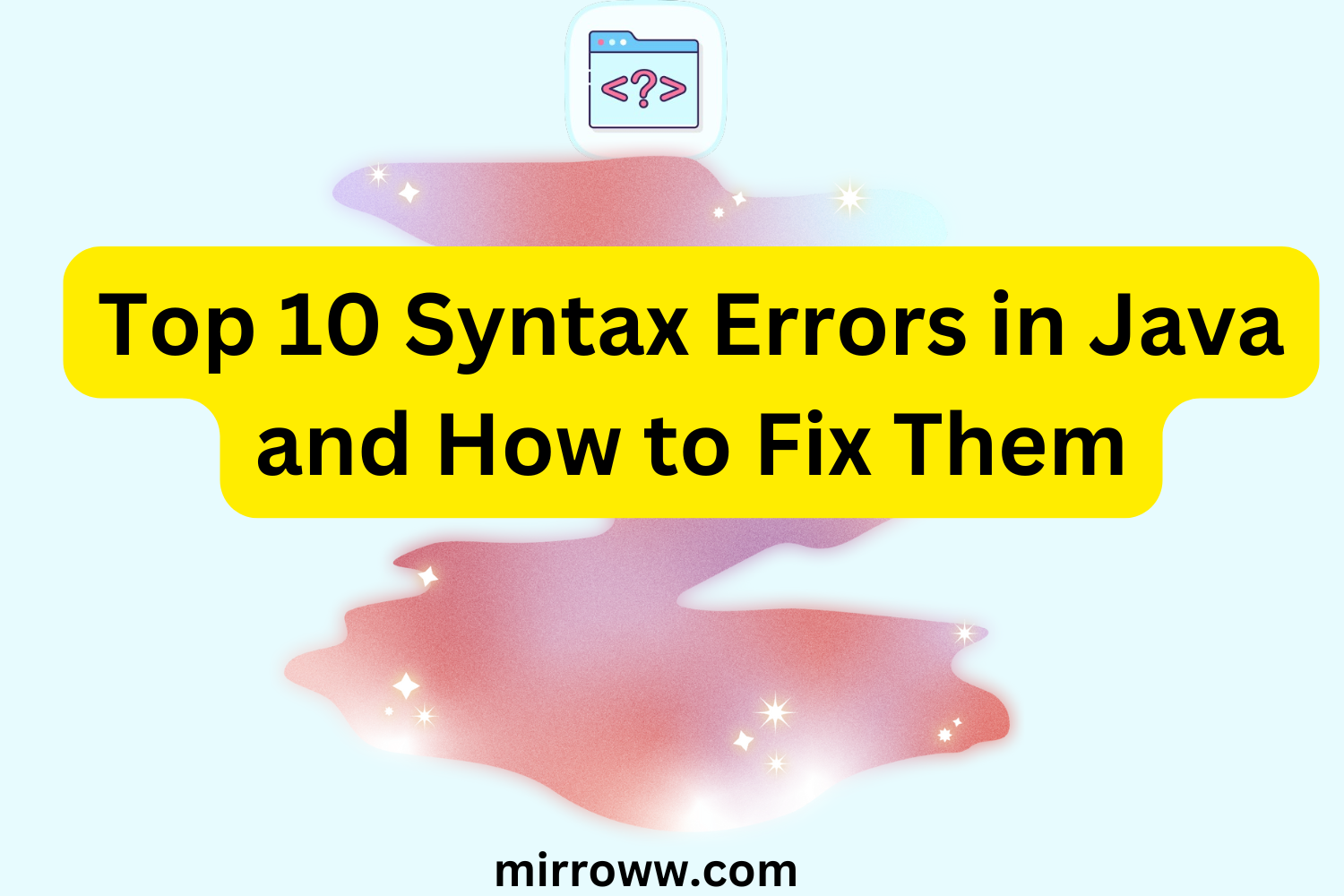Learning Java is like stepping into a vast, complex maze. While the language itself is powerful, it’s also riddled with opportunities to trip up—especially when it comes to syntax. Whether you’re a beginner or a seasoned developer, syntax errors can be the stuff of nightmares. But don’t worry; this guide will help you navigate ten of the most common Java syntax errors and, more importantly, how to fix them. Let’s dive in!
1. Missing Semicolons
Think of semicolons as the punctuation marks of Java. Without them, your code is incomplete.
The Problem:
System.out.println("Hello, world") // Missing semicolon
The Fix:
Add a semicolon to the end of the statement:
System.out.println("Hello, world");
Why It Matters:
Java expects a semicolon to indicate the end of a statement. Skipping it causes a compilation error.
2. Mismatched Braces
If semicolons are punctuation, braces are the chapters of your code’s story. Mismatched braces are like skipping a chapter—chaos ensues.
The Problem:
public class Main {
public static void main(String[] args) {
System.out.println("Hello, world!");
// Missing closing brace
The Fix:
Always ensure every opening brace has a matching closing brace:
public class Main {
public static void main(String[] args) {
System.out.println("Hello, world!");
}
}
Pro Tip:
Use an IDE that highlights matching braces to avoid this mistake.
3. Case Sensitivity Errors
Java is case-sensitive, and it’s not shy about reminding you.
The Problem:
String myString = "Hello";
system.out.println(myString); // Incorrect capitalization
The Fix:
Correct the capitalization:
String myString = "Hello";
System.out.println(myString);
Why It Matters:
Class names, variables, and methods must match their declared case exactly.
4. Using Reserved Keywords as Identifiers
Reserved keywords are sacred in Java—use them incorrectly, and you’ll face the wrath of the compiler.
The Problem:
int class = 10; // 'class' is a reserved keyword
The Fix:
Choose a different name:
int myClass = 10;
5. Missing Main Method
Every Java application needs a main method. Without it, your program won’t run.
The Problem:
public class Main {
public void start() {
System.out.println("Missing main method");
}
}
The Fix:
Include a properly defined main method:
public class Main {
public static void main(String[] args) {
System.out.println("Main method added");
}
}
6. Incorrect Import Statements
Import statements tell Java where to find your classes, but one typo and your code goes nowhere.
The Problem:
import java.util.Scanner;
// Forgot to use Scanner class
public class Main {
public static void main(String[] args) {
scanner input = new Scanner(System.in);
}
}
The Fix:
Fix the import and class usage:
import java.util.Scanner;
public class Main {
public static void main(String[] args) {
Scanner input = new Scanner(System.in);
}
}
7. Null Pointer Exceptions
Technically not a syntax error but a runtime error that often stems from improper initialization.
The Problem:
String name;
System.out.println(name.length()); // Variable not initialized
The Fix:
Always initialize variables:
String name = "John";
System.out.println(name.length());
8. Type Mismatch Errors
Java’s strict typing is both a blessing and a curse.
The Problem:
int number = "10"; // Cannot assign a string to an integer
The Fix:
Ensure types match:
int number = 10; // Correct type assignment
Read more: Debugging Syntax Errors in JavaScript: Tips for Beginners
9. Forgotten Break in Switch Cases
Omitting a break statement in a switch can lead to unintentional fall-through.
The Problem:
switch (day) {
case 1:
System.out.println("Monday");
case 2:
System.out.println("Tuesday");
}
The Fix:
Include a break for each case:
switch (day) {
case 1:
System.out.println("Monday");
break;
case 2:
System.out.println("Tuesday");
break;
}
10. Array Index Out of Bounds
Arrays are great until you’re reaching where you shouldn’t.
The Problem:
int[] numbers = {1, 2, 3};
System.out.println(numbers[3]); // Index out of bounds
The Fix:
Always check your indices:
int[] numbers = {1, 2, 3};
System.out.println(numbers[2]); // Correct index
Conclusion
Syntax errors are the hurdles every Java developer must jump over. But now, armed with this guide, you’re better equipped to tackle them head-on. Remember, even the most experienced developers make these mistakes—it’s how you learn from them that counts.
Start debugging with confidence, and the next time you encounter a red squiggly line in your IDE, you’ll know exactly what to do. Happy coding!

